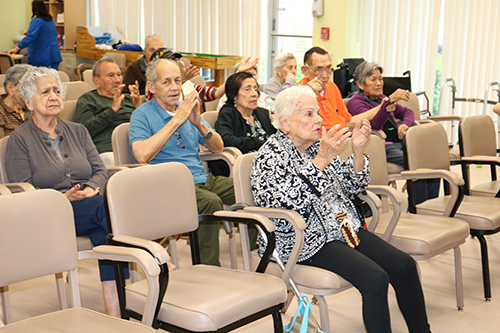By Tom Tracy - Florida Catholic
WILTON MANORS | In response to the growing COVID-19 pandemic and its increasing threat to older Americans, Catholic Charities of the Archdiocese of Miami has shifted to a mobile meal delivery program for some 700 elderly clients in South Florida.
Peter Routsis-Arroyo, CEO of Catholic Charities, said in a phone call March 16 that the logistical shift impacts the agency’s congregate meals sites in Miami-Dade County which serve nutritious, hot meals to men and women 60 years of age and older.
The change also concerns its adult day care centers in Broward County which help disabled adults and seniors who require care during the day.

Photographer: LINDA REEVES | FC
Clients of Centro Oeste Adult Day Care Center in Davie, run by Catholic Charities of the Archdiocese of Miami, join in prayer as they begin a day of activities in this file photo from June 2019. In response to the coronavirus threat, Catholic Charities will begin home delivery of meals to clients of its elderly services and congregate meals programs.
Currently, Broward County is reporting the highest number of confirmed coronavirus cases in the state, according to the Florida Department of Health. As of noon March 16, Florida reported 155 positive cases of COVID-19 and four deaths statewide associated with the virus.
“We have 12 senior centers and we can no longer gather there and provide 700 lunches a day, so we brought in staff to help deliver meals to take off some of the burden,” Routsis-Arroyo said.
Some of those senior centers are affiliated with Catholic Health Services housing facilities, such as the St. Vincent de Paul residence and St. Monica Gardens in Miami-Dade County. Others are affiliated with parishes, such as the St. John Bosco and Gesu senior centers in Miami. Others are operated by Catholic Charities, such as the Malcolm Ross and South Dade senior centers.
The meal deliveries are being handled by internal staff but in other cases arrangements have been made to bring in deliverable food in conjunction with the state of Florida.
“The instructions are we are supposed to tell the elderly person to put a seat outside of their door, we knock on the door, set the delivery on the chair and we stay six feet away,” Routsis-Arroyo said.
According to the Catholic Charities website, congregate meal programs serve eligible seniors, 60 and older, who live independently in their homes. The programs are a way to promote their independence, help them maintain good nutrition, reduce loneliness, make new friends, and increase self-esteem.
In Broward, Catholic Charities operates three adult day care centers: Central West and Centro Oeste in Davie and one in Wilton Manors.
Globally, older populations have been experiencing the highest percentage of complications from the COVID-19 pandemic. The elderly are being asked to self-isolate for the foreseeable future. All persons at higher risk for serious illness from COVID-19, because of age or long-term health problems, are being urged to take actions to reduce the risk of contracting the disease.
The Centers for Disease Control and Prevention are urging that communities include older adults, people with disabilities and the organizations that support them in any planning for COVID-19, to ensure their needs are taken into consideration.
Speaking more broadly, Routsis-Arroyo said in-house quarantine plans are being readied at Catholic Charities residential programs and unaccompanied minors facilities in South Florida. The agency operates a variety of facilities including St. Luke's Center for alcohol and substance abuse treatment in Miami, and New Life Family Center, an emergency homeless shelter in Miami.
“In our residential programs and unaccompanied minors programs we have designated some spaces internally for isolation if one of our (clients) tests positive (for COVID-19), he said. “It is more complicated with children, who can't be left alone. We will have to make sure our staff have the proper gear in terms of masks and gloves.”
As for the hundreds of Catholic Charities Miami staff working across the region, some may be able to work at home but not all.
Either way, “we are in constant communications with my senior management staff, and as long as we can communicate, we get messages right down to everyone who has to hear them,” Routsis-Arroyo said.
He noted that the pandemic is a fluid situation unlike any of the hurricanes or other emergencies he has experienced in his career.
“I’ve never been through a pandemic and its new territory for me. It's so fluid and changing day to day,” he said, adding: “I thought it was good news that Miami Dade and Broward and now national (said) it was closing down schools for two weeks.”

